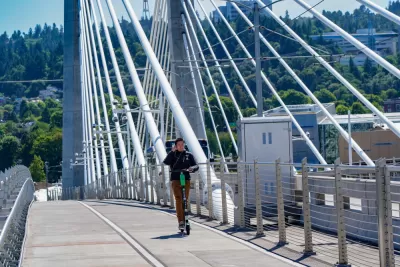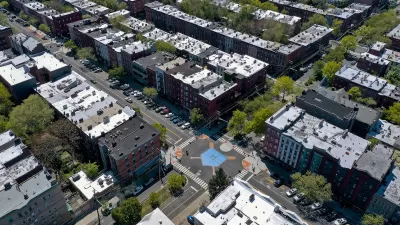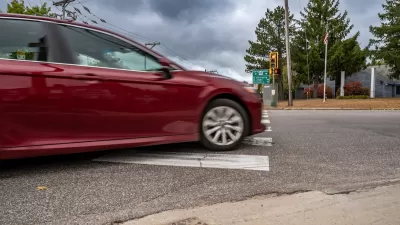E-scooters are governed by hundreds of regulations aimed at improving the safety of riders and pedestrians. Is it time to apply them to cars, too?

[Updated September 2, 2021] Streetsblog's Kea Wilson questions why, while cities have scrambled to create "hundreds of policies to minimize the downside risks of the micromobility revolution, like scofflaw riders who strike pedestrians at intersections and scooter-cluttered sidewalks rendered impassable to people who use assistive devices," no new laws have been aimed at drivers–those who cause 80 percent of fatal scooter crashes and close to 40,000 fatalities on U.S. roads every year.
Wilson outlines five scooter regulations that could be applied to cars:
- Top speed limits: with the top speed limit in the country at 85 miles per hour, Wilson asks, why should manufacturers produce cars that top out at 112 miles per hour?
- Geofencing: "Following the news that the European Union would require all new car models to come equipped with geofence-equipped speed governors that would force drivers to (mostly) obey local limits, some street safety advocates wondered whether the U.S. should do the same thing."
- Stricter height and weight limits: while weight limits for scooters are strictly regulated, American cars and trucks are growing bigger and bigger, with few legal limits on their size.
- Regular safety tests: "For years, most scooter companies have either required their riders to take a brief safety quiz before unlocking a vehicle, or at least incentivized them to learn more about safe scooting with offers of discounted rides, cheap helmets, and other perks." Why not implement a similar system for drivers, mandating the "[i]nterlock ignition devices, ambient alcohol sensors, driver monitoring systems, and a ton of other tech" that already exists?
- Helmet laws: "no U.S. community has never enforced a mandatory car-helmet law, even though car crashes are the second most common cause of traumatic brain injuries every year." The history of Streetsblog's recent editorial coverage of helmet laws should make is clear that helmet laws are included on this list is to point out the absurdity of using helmets laws as a replacement for meaningful systemic safety reform.
FULL STORY: What If Drivers Had to Follow Scooter Laws

Study: Maui’s Plan to Convert Vacation Rentals to Long-Term Housing Could Cause Nearly $1 Billion Economic Loss
The plan would reduce visitor accommodation by 25,% resulting in 1,900 jobs lost.

North Texas Transit Leaders Tout Benefits of TOD for Growing Region
At a summit focused on transit-oriented development, policymakers discussed how North Texas’ expanded light rail system can serve as a tool for economic growth.

Why Should We Subsidize Public Transportation?
Many public transit agencies face financial stress due to rising costs, declining fare revenue, and declining subsidies. Transit advocates must provide a strong business case for increasing public transit funding.

How to Make US Trains Faster
Changes to boarding platforms and a switch to electric trains could improve U.S. passenger rail service without the added cost of high-speed rail.

Columbia’s Revitalized ‘Loop’ Is a Hub for Local Entrepreneurs
A focus on small businesses is helping a commercial corridor in Columbia, Missouri thrive.

Invasive Insect Threatens Minnesota’s Ash Forests
The Emerald Ash Borer is a rapidly spreading invasive pest threatening Minnesota’s ash trees, and homeowners are encouraged to plant diverse replacement species, avoid moving ash firewood, and monitor for signs of infestation.
Urban Design for Planners 1: Software Tools
This six-course series explores essential urban design concepts using open source software and equips planners with the tools they need to participate fully in the urban design process.
Planning for Universal Design
Learn the tools for implementing Universal Design in planning regulations.
Ascent Environmental
Borough of Carlisle
Institute for Housing and Urban Development Studies (IHS)
City of Grandview
Harvard GSD Executive Education
Toledo-Lucas County Plan Commissions
Salt Lake City
NYU Wagner Graduate School of Public Service





























